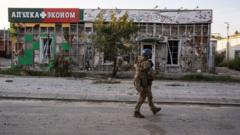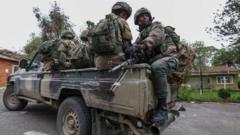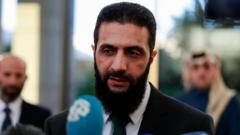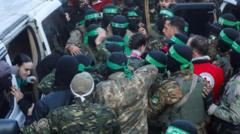The assassination of General Igor Kirillov may send a message to Russian elites, but with ground losses escalating for Ukrainian forces, experts warn it won't alter the overall war dynamics.
Killing of Russian General Highlights War's Stalemate in Ukraine

Killing of Russian General Highlights War's Stalemate in Ukraine
Ukraine's intelligence victory marks a turning point that offers little hope for shifting the tide of battle.
Despite the high-profile killing of Russian General Igor Kirillov, military analysts are urging caution about overestimating its impact as Ukraine continues to lose vital territory. On a Moscow street, Kirillov, accused of deploying banned chemical agents in Ukraine, was killed by Ukraine’s intelligence services. This incident highlights Ukraine's operational capabilities but fails to change the grim reality on the front lines, where Ukrainian forces are increasingly besieged by Russia’s superior military strength.
Experts emphasize that while the assassination may instill fear within the Russian military, it does little to enhance Ukraine’s standing in an ongoing confrontation marked by significant battlefield challenges. General Oleksandr Syrsky indicated that active engagements are now occurring along a staggering 700 miles of front lines, with Russian forces advancing towards key locations such as the strategically important rail hub of Pokrovsk.
Amidst these pressures, more than 300,000 residents in the eastern Donetsk region are being evacuated due to the escalating threats. Notably, Russia is also backed by fighters from North Korea, intensifying a counteroffensive aimed at reclaiming territories held by Ukrainian forces in the Kursk region.
In summary, military experts maintain that while the assassination could create psychological ripples within Russia’s upper echelons, it ultimately reflects more on the ongoing conflict's stubborn nature than it does on any substantial shift in momentum. The war appears stagnant, with urgency mounting on all sides to rethink strategies in a rapidly evolving situation.
Experts emphasize that while the assassination may instill fear within the Russian military, it does little to enhance Ukraine’s standing in an ongoing confrontation marked by significant battlefield challenges. General Oleksandr Syrsky indicated that active engagements are now occurring along a staggering 700 miles of front lines, with Russian forces advancing towards key locations such as the strategically important rail hub of Pokrovsk.
Amidst these pressures, more than 300,000 residents in the eastern Donetsk region are being evacuated due to the escalating threats. Notably, Russia is also backed by fighters from North Korea, intensifying a counteroffensive aimed at reclaiming territories held by Ukrainian forces in the Kursk region.
In summary, military experts maintain that while the assassination could create psychological ripples within Russia’s upper echelons, it ultimately reflects more on the ongoing conflict's stubborn nature than it does on any substantial shift in momentum. The war appears stagnant, with urgency mounting on all sides to rethink strategies in a rapidly evolving situation.




















